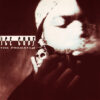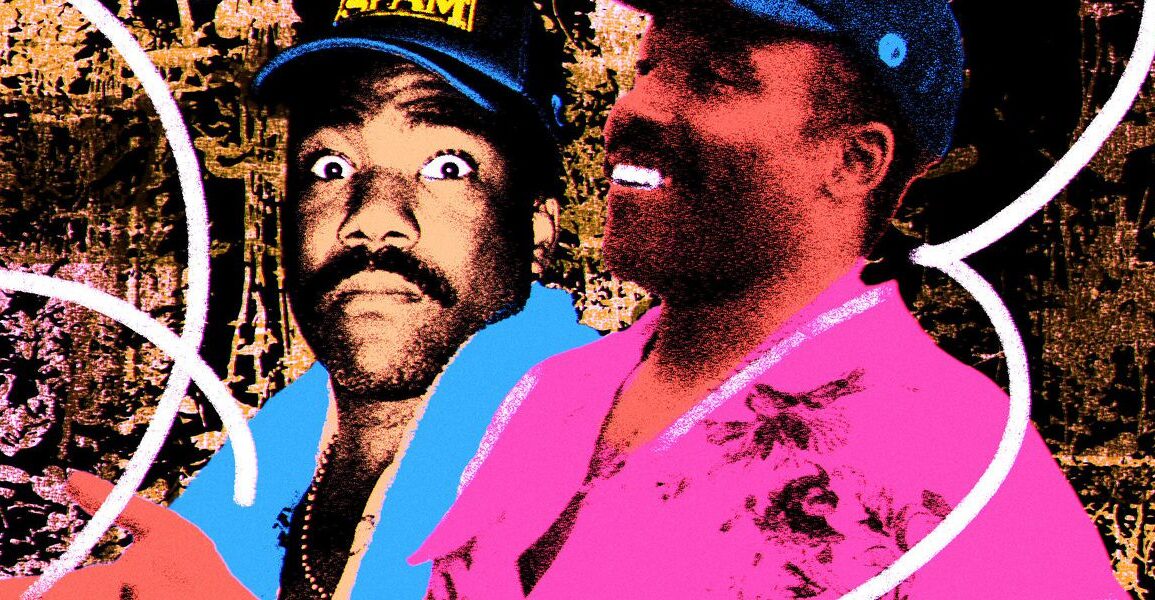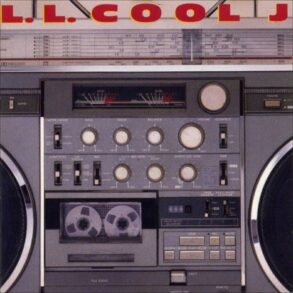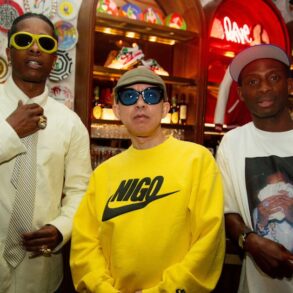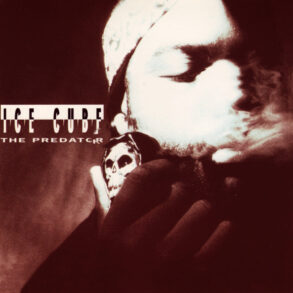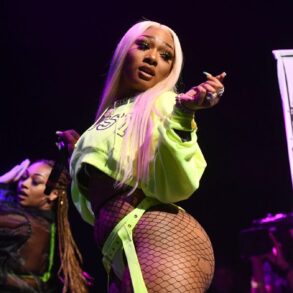The indie novelty rapper turned funk-and-R&B extraordinaire has released his final album, ‘Bando Stone & the New World.’ If this really is the end for Donald Glover’s alter ego, it’s worth asking: What was that thing, anyway? And why didn’t it get the credit it deserved?
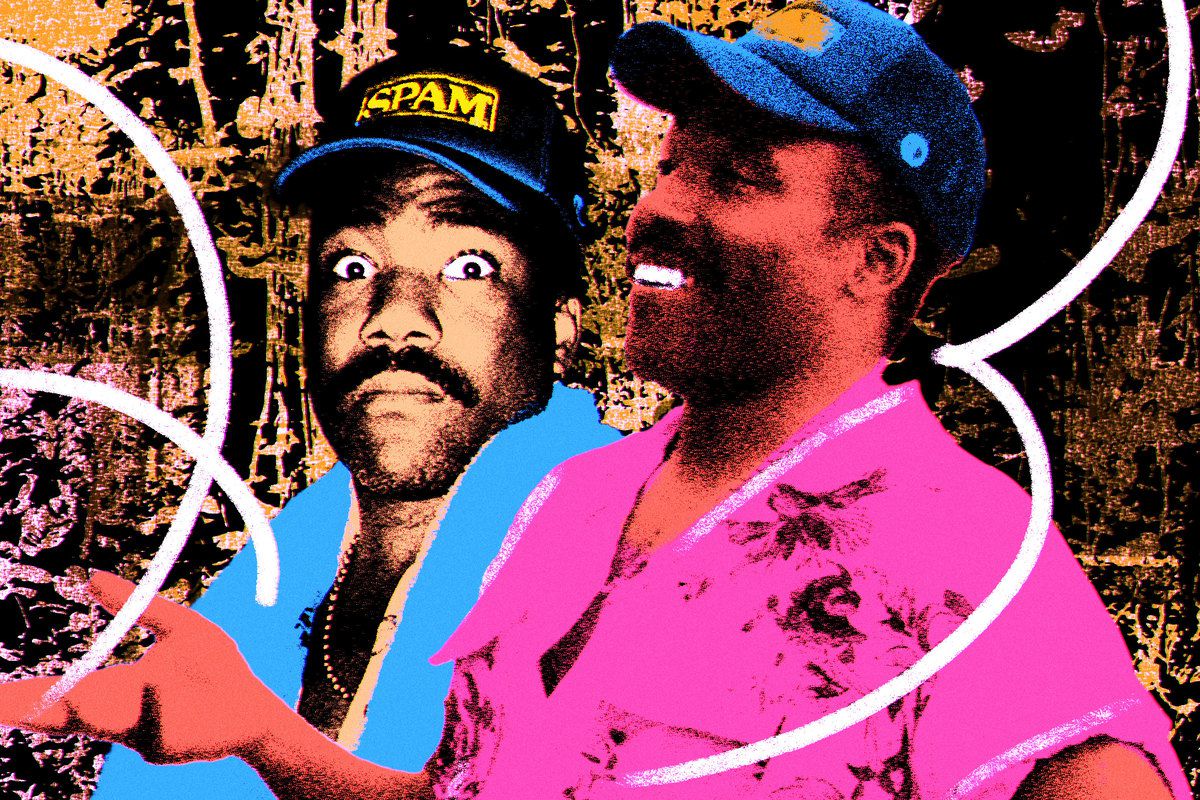
Ringer illustration
The phrase “music culture in the streaming age” often gets listeners rumbling about the death—or, at least, the increasingly strained relevance—of genre. We still recognize the conventional differences among, say, “Not Like Us” (hip-hop), “Need a Favor” (country), and “Please Please Please” (pop). There’s still hip-hop, country, and pop radio, of course, but these are waning formats, as streaming has outgrown radio in terms of listenership, and streaming, rather unlike radio, has a way of collapsing all artists, fan bases, and subcultures into singular platforms. Modern artists furthermore take an expansive view of their own musical forms. Post Malone is a rapper who primarily sings. Country music is full of trap drums. Pop is all-consuming—it claims both Drake and Morgan Wallen. You could view these shifts pessimistically, as the relentless homogenization of mainstream music culture. You could also view them optimistically, as the boundless interplay of previously disparate styles.
No other artist embodies the supposed death of genre more constructively than Childish Gambino, the musical alter ego of Donald Glover. On Friday, Glover released Bando Stone & the New World, purportedly his final album under his current moniker. He’s ending a low-key legendary run: five albums, four EPs, and more than a dozen mixtapes, released over 19 years, tracking the artist’s unlikely transformation from indie novelty rapper to five-time Grammy winner who made an especially ambitious foray into funk and ultimately contributed a hefty volume to the millennial rap canon. This, even though Gambino is a marginal figure compared to his generational peers—Drake, J. Cole, and Kendrick Lamar—in hip-hop.
Donald Glover is a musician but also an actor and then additionally a writer, director, and stand-up comedian. But Donald Glover does not dabble. He has maxed his stats in every category. Naturally, Bando Stone isn’t only an album but also a feature-length movie with a postapocalyptic sci-fi setup. (The first and only trailer to date didn’t reveal a release date, and the promotional website for Bando Stone only says it’s “coming soon to IMAX.”) The soundtrack is an eclectic mix of combative rapping (“Talk My Shit,” “Yoshinoya”) and falsetto crooning (“In the Night,” “No Excuses,” “Steps Beach”) and even some throwback emo (“Lithonia,” “Running Around”). It’s a valedictory survey of everything Gambino has been and then also an epilogue, revealing a proud dad at something close enough to peace. He raps on “Yoshinoya”: “You fucking these hoes, I’m fucking my wife.” Roll the end credits. In a recent interview with The New York Times, Glover said it was no longer “fulfilling” to continue as Childish Gambino, “and I just felt like I didn’t need to build in this way anymore.” (If you read between the lines, Glover seems to be leaving the door open to releasing new music under a new moniker or else under his real name.)
Glover now has so many ways to build, in so many formats, and with so many platforms at his disposal. He voiced Simba in The Lion King, he played a young Lando Calrissian in Star Wars, and now he’s working with his brother and longtime writing partner, Stephen Glover, to produce a spinoff movie, tentatively titled Lando. He loosely remade Mr. and Mrs. Smith, as both cocreator and costar, as part of a “multiple-year, eight-figure overall deal” with Amazon Studios, per The Hollywood Reporter. Donald Glover is big business. Childish Gambino, then, is a holdover from the period when he was something a bit wilder—a tremendously multitalented figure who nonetheless second-guessed himself and struggled to get out of his own way. A restless wanderer on the scenic route to unthinkable success.
Childish Gambino is, avowedly, a rapper. His moniker is famously the product of the Wu-Tang Nickname Generator. Gambino spent most of his first two albums, Camp and Because the Internet, delivering punch lines with breathless flow. He responded to his conspicuous omission from Kendrick Lamar’s hit list on Big Sean’s “Control,” which targeted Drake, Kendrick Lamar, J. Cole, et al., with a freestyle at a concert in Australia declaring himself “the best rapper alive.” He very evidently wishes for more credit than he tends to get in the grand scheme of millennial hip-hop. Musically, Gambino was consonant with the moody rap-sung/post-rap styles otherwise popularized in the late 2000s and early 2010s by Kanye West, Kid Cudi, B.o.B., Drake, Frank Ocean, and Tyler, the Creator. These guys each, to varying degrees, blurred the lines between rapping and singing—between hip-hop and everything else. Gambino was especially elastic. Listen to a bit of Camp (2011) and then listen to a bit of Because the Internet (2013): His rate of growth, both production-wise and thematically, was mind-boggling, as was his ability, in an age of frequent collaborations, to construct a largely self-contained musical universe, including hip-hop but also everything else in the ear of his generation. Gambino was perhaps isolated from the rest of hip-hop culture, but he seemed bigger as a result.
In his early to mid-20s, Glover was a writer for 30 Rock, a stand-up comedian, and a sitcom star on Community. He was massively accomplished for his age. Initially, Childish Gambino seemed to be, at most, a half-serious side project. He’d drop a few mixtapes and earn some hipster acclaim before the act fizzled into the footnotes of blog rap history when he’d inevitably prioritize Hollywood. But then Glover in the 2010s doubled down on Childish Gambino and made increasingly essential music through, and after, the premiere of Atlanta on FX. The synthesis of Glover and Gambino was captivating. This was the strange case of an entertainer pivoting from a supposedly more respectable profession—TV writing and acting—to hip-hop, rather than the other way around. Drake was a successful actor before he was a rapper, too, but I don’t think anyone believes he gave up a certain stardom in another form when he turned to hip-hop; Glover was a far more promising prospect in Hollywood, and so Childish Gambino was a much riskier and much more interesting pivot. Glover didn’t turn to hip-hop to become cool. He turned to hip-hop to reveal how deeply uncool he was. He was enigmatic. He was provocative. He was a righteous loser who modeled youthful suburban rebellion on hypermodern terms. To the like-minded, Childish Gambino was irresistible.
It’s tough to fully relay the significance of those early records by Gambino without also recalling the turmoil evident in his posts on social media during this period. He famously shared a series of dark musings, scribbled into a notepad at a Residence Inn, that many of his followers at the time interpreted as a suicide note: “I didn’t leave Community to rap. I don’t wanna rap. I wanted to be on my own.” The very fact that Glover shared his anguish so openly and artfully, as Gambino, put him on the same emotional wavelength as Kanye West and Kid Cudi, even if Glover wasn’t quite yet as refined or releasing music at the same scale. Gambino was, in fact, the deepest, darkest, truest, rawest expression of Donald Glover. Camp was an anxious Black boy from the suburbs of Georgia airing all sorts of insecurities—racial, sexual, professional—in all caps. It was mortifying, in the most worthwhile way, that something could be so mortifying. Because the Internet is, exactly as its title suggests, an extremely online meditation on modern life, released right as social media had started to become so dreadfully immersive. Gambino’s projects were milestones. And Bando Stone really does feel like a final destination.
In some respects, Glover’s multi-hyphenate eclecticism has always been a little maddening. “Awaken, My Love!” is a modern funk masterpiece that sounds strikingly out of place in Gambino’s otherwise rap-driven discography. “This Is America” is a bit of a head-scratcher as far as civil rights anthems go; Gambino initially conceived the song as a petty dig at the Canadian Drake. Atlanta is a savvy satire that at turns depicts hip-hop as the invaluable art form of a proud people and an absurd commercial farce. Glover doesn’t dabble, but he does elude any easy assessment of his intentions. He dares everyone to disprove the common lament about fans and critics these days: Media literacy is at an all-time low. But he also still embodies so many hasty and extremely online impulses in himself. He’d overreact to the slightest, scarcest criticism that would surface in the sea of acclaim for Atlanta. He’d interview himself and awkwardly attempt to diffuse every sidelong complaint that anyone has ever made about him in the past 15 years. There’s still some tumult there, clearly.
A few weeks ago, Gambino made headlines with a humorous rant on stage at the BET Awards. “I have more Grammys than Will Smith, which makes no sense, but I have the same amount of BET Awards as Sam Smith. Does that make sense to you guys?” Glover, as always, struck an ambiguous tone—it’s tough to say how much of his rant is his being comedically observant vs. being genuinely angry about the supposedly insufficient validation. “It’s the Black Entertainment Television Awards. How much more entertaining do I have to do?” Notably, the news websites covering these remarks referred to him in this case not as Donald Glover, but rather as Childish Gambino—as the deepest, darkest, truest, rawest expression of the entertainer. He won’t be making any more music, but, vengefully, his impact resounds.
This post was originally published on this site be sure to check out more of their content.



